Another two years later, I need those words. I find myself challenged even more with a hospital stay. It’s a new experience for me, as is needing any surgery, let alone two. All this has been unexpectedly thrust upon me. Yet even in these challenging circumstances, I can still choose my response. And so can you. No matter what life gives, when you choose to act, you can fight your fears with faith. Pray and act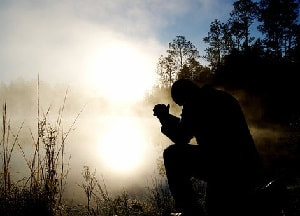 My most recent trouble began with abdominal pain, coming hard, fast, and sharp one afternoon. It seemed to wane as the night came, so I thought I might sleep it off. But the pain returned very soon after awakening. Having recently been diagnosed with an ulcer, I thought the pain might be excess stomach acid. I took a couple of antacid tablets and waited, but the pain continued on. And it was so massive, I couldn’t ignore it. But I didn’t know what to do. So I prayed for help. A voice I felt more than I heard whispered, “Go to the emergency room.” I looked at the time and wondered if I shouldn’t try to tough it out for three or four more hours, because then the clinic, which costs less than the emergency room, would be open. Again the voice whispered, “Go to the emergency room.” So I got dressed, put my shoes on, and went. There was certainly no sense of emergency in the people working there. Eventually I learned my previous diagnosis of an ulcer was not correct. My real problem is pancreatitis, a severe inflammation of the pancreas caused, in my case, by gallstones. But here’s where it gets tricky. Some of those gallstones have traveled into the bile duct connecting the liver with the pancreas. Those must be removed before the gallbladder. Due to differences in how surgeons enter the body for each of these tasks, two surgeries are necessary. Make your choice The universe isn’t without a sense of irony. I was thinking just the other day very little in my life is actually going my way. Everything seems a challenge, and I’m continually fighting from the edge of a cliff hoping not to fall over the edge into despair. Then I get this. As if that isn’t bad enough, the first surgery’s scheduled for Monday. Yeah, that’s right. I’m going to be under the knife on Halloween. I think I’ve had my fill of irony! Still, the choice we all have remains for me. Where will I place my focus? And what action will I choose? Sure, I have fears. In addition to ones stemming from current events, some of the same fears that plagued me four years ago continue to haunt me today. That’s because I haven’t taken sufficient action to build the faith needed to conquer those fears. And so it goes for us all. When we focus on what we lack, we encourage inaction, and faith being a principle of action cannot thrive, leaving fear to reign. But when we focus on what we can do and take action, always taking the next step we can take, we build the faith we need to fight fear. Don’t slow down It’s so easy to step back and surrender to fear. So often we all choose habits of maintaining the status quo rather than consciously maintaining our momentum towards our best life. But the easy choice rarely leads to great reward. Faith is built only through action. To have the faith the face your fears, you must act. Initially, any action will do, just to get some momentum. Once you start building enough momentum through any action, then you can shift your direction so you move towards your best life. When you choose to act, you can fight your fears with faith. The Lord hasn’t given up on you, so why should you? Take His strength, act in that strength, and no matter what comes your way, you can truly believe great things are in store for you. And that will bring you more joy in your journey.
0 Comments
Faith clarifies vision We all judge too much by what we see directly around us, and this feature especially manifests itself in dating. Far too often LDS singles look around for someone they’d like to date and, not seeing what they define as acceptable, quickly become discouraged. That scene repeated often enough leads to hopelessness in the future. Bright futures start with faith. Faith helps you see what’s there but not readily seen. In the context of dating, this could mean, first, you don’t see that acceptable candidates around you because they aren’t doing what you normally do and going where you normally go. When you branch out and see new vistas, you’re more likely to cross paths with them. The world is a bigger place than your own backyard. Second, faith helps you see the person you discounted may be the one you’re looking for. So many singles insist on having the “perfect” partner that they reject knowing many less-than-top-shelf candidates who’d make good partners. Falsely assuming only the best can produce joy in life has kept and continues to keep many LDS singles single long than need be. Action feeds power Lack of hope in the future often attends feeling powerless. A focus there will lead only to despair. To change your reality, you must change your focus. Instead of focusing on the “evidence” for why what you want won’t happen, seek out reasons to believe. Those reasons to believe will be easier to embrace when you take proper action. I’ve never seen anyone busy working to make his or her dreams a reality feeling powerless, and neither have you. That’s because it’s impossible. When you busy yourself with the business of doing, you’re so immersed in evidence of your own power you can’t feel powerless. It’s when you’re not doing anything that feelings of powerlessness can take hold. Start feeling that power and savoring your life by listing what makes up your best life. If you could have your best life, what would it look like? What would you be doing? Put those activities on your list. Then start to fill your calendar with those activities. So if you think your best life involves horse riding, great. When are you going to ride that horse? If you think your best life involves learning how to crochet, great. When will you learn that? Whatever you want your life to be, start doing what you can to live that life. Don’t let what you lack prevent you from embracing — and finding joy in — what you already have. Partner with Him While you’re making that list, don’t forget to partner with the Lord. When you include Him in crafting your best life, you’ll get there much more easily than if you go it alone. He might even help you see that what you think is your best life really isn’t. Make the course correction He suggests, and you’ll not leave any joy on the table. The key to maximizing joy in life is focusing on fundamentals. Far too many LDS singles focus on finding ways to cross paths with that special someone, all the while forgetting that if they aren’t agreeable enough, no quantity of paths crossed will produce the desired result. When you focus first on living your best life as much as you can, you make yourself more agreeable and your life more inviting. That life is also the more joyful one, and that joy will only increase your attractiveness to a potential companion. The future really is as bright as your faith. When you focus on fundamentals, you can take more effective action. More effective action produces more effective results. More effective results will help you feel more powerful and desirous to do more, and thus the cycle continues ever upward. And that will bring you more joy in your journey.
As I carefully re-read Elder Ochoa’s address in preparation for the broadcast, I see I had assumptions that led me to a different conclusion than what Elder Ochoa likely intended. When you approach your life with the right assumptions, you can ask “Is the plan working?” and know that it is. Recognize your faulty assumptions  My assumptions began to influence my thinking from the start. When Elder Ochoa mentioned a young returned missionary whose life wasn’t working out the way he expected, I instantly assumed that young man was single. It seemed right to think that. Increasingly LDS singles aren’t marrying at all, and those who do marry do so later. Thus, many LDS singles wonder how the plan of happiness can be working for them when they seem shut out from the blessings of happiness they desire. In that light, Elder Ochoa’s address could’ve been addressing LDS singles when he said,
But Elder Ochoa never identified that discontent young man as single. He may have been single, but he also could have been married. We simply don’t know because Elder Ochoa never said. That’s important, because my assumption the man was single led me to an erroneous conclusion about Elder Ochoa’s address. Distinguish between two plans 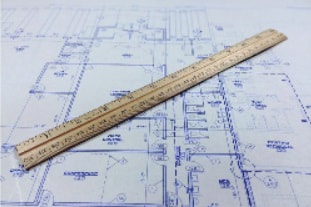 Here’s the real problem: There’s two plans we’re talking about here. The first is God’s plan for His children that spans eternity. The second is our plan for our lives here in mortality. With both plans intended to result in our happiness, it’s easy to get them confused. Many LDS singles do in fact confuse them because of faulty assumptions behind their thinking. The largest of these is the idea that righteous blessings result from righteous behavior. The faulty connection assumed here provides particular challenge when the blessing sought is marriage, a blessing not predicated entirely or even largely on righteous behavior. Notwithstanding, those singles who chose to assume that faulty connection in their thinking are more likely to turn tone deaf when they hear messages like this:
Many LDS singles who falsely assume righteousness leads to marriage hear that and respond, “What are you talking about? I’m trying to honor my covenants, so of course I’m following Jesus. But I still don’t have my desired blessings, so how can you say the plan works?” Again, we’re talking about two different plans here. Just because our plan for mortality isn’t working doesn’t mean God’s plan for eternity isn’t also. Focus on the right plan  Elder Ochoa doesn’t address that distinction. His solution for people who feel the plan of happiness isn’t working for them is to act in faith, turn to Jesus, and humble themselves. That’s a great approach when you’re talking about God’s plan that spans eternity. But it offers little to those largely concerned with receiving a blessing in this life. That’s why my faulty assumption at the start of his remarks led me to conclude falsely. Every time Elder Ochoa speaks of “the plan of happiness,” he’s talking about God’s plan that spans eternity. But my faulty assumption at the start got me focused on receiving a blessing in mortality. And with that focus, I couldn’t connect with Elder Ochoa’s real message. Is the plan working? That depends on which plan you’re talking about. If you’re talking about the plan you make for yourself for happiness in mortality, then it may or may not be working, depending on your assumptions. But if you’re talking about the plan God made for His children to be happy in eternity, then yes, that plan is working great so long as we make and keep every sacred covenant we can. When you question your assumptions and get clear about distinguishing between God’s plan for life in eternity and your plan for life in this world, you can better feel the power of perspective helping you to let go of everything holding you back from enjoying each moment irrespective of your circumstances. And that will bring you more joy in your journey.
That relaxed attitude was no match for the “Yeah, but”s that always intervene when we’re stretching ourselves out of our comfort zone. “You should work on that dream” confronts “Yeah, but it’s been a long day and I’m too tired” and you don’t make any progress on your goals and dreams. “You should finish that task” meets “Yeah, but I’ve got bills to pay [or insert other work that appears to take priority]” and you don’t make any progress on your goals and dreams. So if you want to move towards your goals and dreams, don’t be a butthead! Leave your comfort zone  So long as we stay within our comfort zones, we’ll always have average lives of mediocrity. And that’s the way our brain likes it. How do I know? Quite simply, it’s designed into our biological hardwiring. Anciently, venturing too far outside your comfort zone could get you killed. Thus, the forces of evolutionary biology adjusted the design of our internal controls. Our biological hardwiring now provides a check point if we go too far beyond the borders of safety. “You don’t really want to go this way” becomes the persuasion of the moment attended by a natural pull back within our comfort zone. It’s all designed to keep us safe. But staying safe will never result in your best life because staying safe leads only to mediocrity. Now, I’m not saying we need to be a reckless version of Evel Knievel. What I am saying is playing it safe every time never got anyone anywhere. Your best life isn’t found inside your comfort zone. If it were, you’d have your best life because it’d be easy to find and you wouldn’t be dreaming of something better. Turn knowledge into action None of this is new to me; I’ve known all of it for years. So why then have I kept slipping? Why hasn’t the knowledge of how my biological hardwiring works translated into forward-propelling action? It’s comforting to know that even with all my slipping the ball’s at the one-yard line, but even still. why isn’t it in the in-zone? I simply haven’t been vigilant watching for lapses. Our biological hardwiring has us operating mostly out of habit, so it’s easy for eyes to drift away from watching out for potential slips. And those opportunities to slip sneak so silently upon us that not watching vigilantly essentially invites slips towards our goals and dreams to occur. Those slips often begin with “Yeah, but.” Without vigilant watching, those “Yeah, but”s come and carry the moment. Each surrender to natural inclination is a vote to stay average. Over time, those votes can aggregate to deliver a life of mediocrity. In this way you can get close to scoring but never actually do. Adopt a new habit  Can you ever get the “Yeah, but”s out of your head? No, they’re a part of your biological hardwiring. But you can develop habits for confronting those “Yeah, but”s successfully. Begin by deciding your response in advance. Then write out that response: “When I get told ‘Yeah, but’ X in such-and-such situation, I will Y.” Writing out your response burns it more into your brain so that, when your trigger event occurs, you’re more likely to follow through with your pre-determined response. Once you play that out enough times, you’ll have a new habit that propels you forward to your goals and dreams. So don’t be a butthead. Don’t just let the waves of life carry you wherever the winds happens to blow. Own your life. Take control. Reject any surrender to “Yeah, but” by setting yourself up to adopt the habits you need to succeed. You’ll find yourself slipping a lot less and scoring wins a lot more on the road to your best life. And that will bring you more joy in your journey.
What impressed me about Sister Porter’s approach was her use of singles to exemplify her ultimate message of the valuable contribution LDS singles can make in their world. It’s a message we’ve been promulgating here at Joy in the Journey Radio by encouraging LDS singles to adopt a personal ministry. We all can powerfully influence those around us for good, and we’ll make that difference in others’ lives when we heed the lessons at the well. You determine your future I love the introduction Sister Porter gives to her remarks. She was happily married and serving with her husband in the Church in Eastern Europe. Then her husband’s health took a turn for the worse, and in short order she found herself single. I don’t know if she actually thought of herself as single. She didn’t mention that in her address, and I know many who’ve lost a spouse to death still consider themselves married by virtue of their temple covenants. If your spouse is not in this life living with you, you may be married for the purposes of eternity, but for the purposes of this life, you’re single. You also have a wonderful opportunity to effect much good. It starts when you realize your past and present circumstances don’t determine your future. In referencing her unexpected return to singlehood, Sister Porter shared,
The woman at Jacob’s well exemplified this attitude, which applies just as much to men as it does to women. She did not allow her past or present condition to determine her future. She chose to testify of the Savior, and her choice blessed many others. You have the power  Likewise, LDS singles can chose to embrace a new future by making the higher choice. Too often LDS singles play the victim, thinking that their past is prologue and nothing they do will make any difference. But that’s true for you only if you decide it is. You’ve been blessed with agency, the second most underappreciated gift of God. And it’s the second most underappreciated gift of God because so many simply don’t realize the power that’s in them because of this gift. Sister Porter recognized it. After quoting D&C 58:26-28 and emphasizing that last phrase in the verses — “for the power is in them” — she declared,
You’re not in this alone! No matter your past or present circumstances, you can choose to let your light shine, share your goodness with others, and put a dent in the universe. With the creator of heaven and earth at your side, why choose anything else? You make the difference This is how great ends come out of small beginnings. The Lord is the Master Gardener, the one best suited to help you grow into the fullness of your potential. He can transform the seemingly meager contributions you make into extraordinary differences. Sister Porter shared three examples from the Master’s teachings that demonstrate this effect, one involving salt, one involving leaven, and one involving light. Each of these items in even seemingly small amounts makes a tremendous difference in their separate contexts. Likewise, though your efforts may seem small and inconsequential, you can make a tremendous difference in your world. Your salt can flavor the lives of others, your leaven can lighten their loads, and your light can disperse the darkness surrounding them. As Sister Porter taught,
Heed the lessons at the well and make the higher choice. When you do, the Savior can turn your seemingly small service into the difference others need in their lives. In easing the burdens of others, you’ll find your own burdens eased. In helping others grow, you’ll find your own growth. And that will bring you more joy in your journey.
Sister Newbold acknowledges a common singles attitude: Identifying yourself by what you don’t have. When you do that, you’ll live in a space where you’re deficient. Sister Newbold’s response is an effective one: Live in a space where you see yourself as you’ll be, because that’s how God sees you. By living “as though” God’s promises are fulfilled, you can be joyful now. Understand the challenge Sister Newbold recognizes the difficulty of reconciling as yet unfulfilled promises with the reality of LDS singles life. Her answer is to live “as though” those promises have been fulfilled, though she admits that’s challenging. She writes, “Given that God is a God of promises, it becomes hard at times for me to reconcile why certain promises have not yet been fulfilled in my life.” I’m sure many singles can relate. I myself felt that challenge a few months ago. In the midst of my most challenging semester of school ever, questions about my patriarchal blessing began to feel more demanding. And given my age, I began to wonder how my promised blessings will ever come to me. Sure, it’s easy to say, “Well, sometimes patriarchal blessings get fulfilled in eternity.” But that doesn’t apply to the married life the Lord promised me. Very clear and unambiguous language speaks of my temple marriage in this life and actions my children and posterity will take in this life. These and other blessings are promised to me in this life, not the next. Given I’m in my late 40s and not getting any younger, questions of how those promises would be fulfilled troubled me. At the time, I really struggled with those questions. Now I simply feel a quiet confidence somehow it’ll all happen. Consider three solutions  Sister Newbold’s answer to that challenge, as mentioned earlier, is to live “as though” promised blessings have arrived. How do we do that? Sister Newbold shares three suggestions. First, she suggests considering a variety of promises. LDS singles tend to fixate on the marriage they by definition don’t have right now. That focus blinds them from seeing other promised blessings they already have, many of which they take for granted. Recognizing these less appreciated but bountiful blessings invites gratitude and trust God will keep all His promises. Second, she suggests recognizing God’s hand in our lives. Many in today’s world focus on what they lack, and as long-time audience members will tell you, your focus becomes your reality. Focusing on lack creates a reality of scarcity, which inhibits the ability to feel joy. But focusing on what you have creates a reality of abundance. I really like how Sister Newbold extends that idea to the sacrament.
Third, Sister Newbold suggests helping the Lord keep His promises to others through Spirit-directed service. When you follow the Spirit’s promptings to help others, you can help answer their prayers. You can find joy in being the Lord’s hands. Trust in Him Honestly, I appreciate a perspective centered on our focus rather than the traditional and highly unhelpful ”Just hold faithful, and everything will be right in the next life.” Additionally, Sister Newbold readily admits that “trusting in His promises is not always an easy choice.” She also says “living ‘as though’ will look different for everyone.” I suspect that’s only true in the particulars. I could summarize what that looks like for her as making and keeping as many covenants as she can, in essence living all of the gospel she can. I think that would describe living “as though” for any LDS single. God will keep every promise made to every one of us. He has thousands of years of experience doing just that for the generations that came before us. And the Spirit can remind us of moments when He’s kept promises in our own lives. So we can trust He’ll keep every as yet unfulfilled promise. When we live“as though” by walking with faith He’ll do just that, we can be instruments in fulfilling His purposes, all the while experiencing the quiet confidence that somehow it’ll all happen for us. And that will bring us more joy in our journey.
See the situation 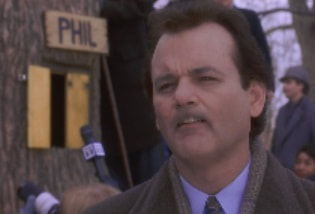 The story begins with Phil Connors, the weatherman for Channel 9 News in Pittsburgh. The man is clearly full of himself, so it’s no surprise no one really likes him, not even himself. He’s a rather disgruntled man who thinks covering the Groundhog Day Festival is beneath him. So imagine his shock when he wakes up thinking it’s February 3rd only to find out it’s February 2nd again. The bewilderment continues as each morning he wakes up to find that somehow in his sleep he went back in time by one day. He keeps living the same day over and over again. His first reaction is denial. This can’t be happening to me! Denial drives resistance, but no matter how he fights against his situation, the next morning is always February 2nd again. His denial then turns into despair. This report he gives at the festival summarizes his condition rather well.
That day ended in suicide, but it doesn’t end him. In despair, Phil keeps trying to kill himself in different ways trying unsuccessfully to escape his never-ending cycle. Note the pivot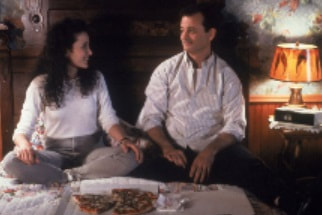 And then one of those February 2nd days becomes a pivot day when everything changes. Phil doesn’t escape the never-ending cycle, but he does find a new perspective on his situation. And what changed everything was Rita. Rita is Phil’s producer. She’s also the apple of his eye. Previously he spent God knows how many successive February 2nd days trying to get into her pants. But on his pivot day, Phil approaches Rita with a different agenda. Instead of trying to satiate his lust, he sincerely cries for help. (Why do I have a Rick Astley song in my head right now?) Rita helps him and in the process begins to fall for him. Of course, that disappears when everything resets the next morning. But Phil remains changed, and he starts spending his February 2nd days improving upon himself, working to become a better, more quality person. He takes up reading all kinds of books. He learns to play the piano. He takes up ice sculpting! Not only do his efforts make him a better person, they make his life more interesting. And the proof is in this report. It’s the same day, same festival, but a completely different Phil.
Once he stopped trying to escape his situation and embraced it, Phil was able to tap into the joy life has to offer every single day. In the end, he escapes the cycle and gets the girl. Take a lesson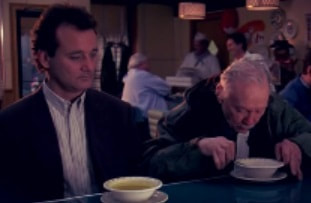 The allegory here to LDS singles is so clear I wonder why I didn’t see it earlier. How many of us singles are in denial? No, I can’t be single. This can’t be happening to me! And no matter what we do to fight it, we seem caught in a never-ending cycle of singleness from which we cannot escape. But if we’d stop trying to escape from it and start embracing it, we could turn everything around. We could start looking inside ourselves and working to become better, more quality people. We can do things to make our lives more interesting. We could tap into the joy God wants us to have every single day. And we could help other singles to have their pivot day. Just as Rita helped turn things around for Phil, we can reach out to one another. Instead of looking only to satiate our own agendas when we interact with each other, we could help each other live better lives. When we take a lesson from Groundhog Day, we can make the most of what seems to be a never-ending cycle of singleness. By embracing our situation instead of trying to escape from it, we can live our best life and help others to do the same. And that will bring us more joy in our journey.
Why we wear masks Masks conceal one’s true identity, allowing that person to act differently without incurring the consequences of having those different actions connected with one’s reputation. That’s why Batman wears a mask — to protect those he cares about from his enemies who would harm them to get to him. That’s not necessarily nefarious. That allows a freedom that couldn’t be found with concern over the consequences of one’s actions. And that’s the key: concern over consequences. You need the mask so others won’t connect what you do with your reputation. But if you were willing to accept whatever consequences came from your actions, you wouldn’t need the mask. You could simply live as you would while others have full view of who you really are. We naturally shy away from such circumstances. We all have a deep-seated need to belong, and it’s easier to belong when you do what everyone around you does — or what everyone around you expects you to do. Wearing a mask allows you have one identity you present to others so you conform to their expectations while in reality holding a different identity that would incur consequences from others if only they knew about that different identity. The application to self  I’m not suggesting all masks are bad. Who doesn’t like Batman? I’m just saying we need to concern ourselves with how we use masks. We need to understand what we’re really doing with the masks we choose to wear. We need to live with intention. As I apply that principle to myself, I see the need to put away a mask I’ve been wearing for myself. I’ve thought of myself as a solid performer in my work, someone who always delivers. But recent experience suggests otherwise. I may have never failed to deliver in a previous time, but times have changed. What happened? I’m not entirely certain. I think part of it is my singleness. Without needing to perform at a higher level needed to support a family, it’s been easier to accept performing at a lower level while maintaining within my psyche an identity that differs from reality. I’ve been wearing a mask so I can feel better about myself. This is one mask I don’t need to wear, because wearing it means living a lie. It’s better to live in truth and embrace who I really am, an imperfect man who experiences setbacks but who also has the potential to rise above those setbacks and conquer whatever challenge lies before him. Embracing that truth means true freedom, because that embrace allows me to live without concern for the consequences of others seeing me as I truly am. Living life in truth What masks do you wear? Have you established for yourself a space of false security so that others will think about you in a certain way or so that you can feel good about yourself? How about having others think about you in that way because you really are that way? How about feeling good about yourself by embracing who you really are? Many of us wear a mask we shouldn’t be wearing. Let’s embrace changes in ourselves so we can really see ourselves as we should be, or let’s embrace our actual self as our ideal. Acquiring and maintaining that match produces self-esteem. Combine that with living with intention, and you’re on your way to your best life. Leave the mask alone. Embrace the freedom that comes from embracing truth. You’ll feel better about yourself, better your life, and better about your future. And that will bring you more joy in your journey.
But I really wasn’t capturing the full depth of those words. Maybe I needed some time and distance as well as some more experience with the world to appreciate what he gave all of us. Indeed, you could say that’s one thing I’m learning. And after the program today, perhaps we all can say it’s one among many of what we are learning. Home-centered worship  Addressing the global pandemic, President Nelson shared four lessons he hoped we’ve all learned and won’t forget. I sense a greater sense of optimism in his words now than I did six months ago. That optimism increases my appreciation for his first lesson: The home is the center of faith and worship. I think most of us recognized the prophetic nature of the 2018 announcement regarding home-centered church. But I’m not sure that was true before COVID hit. I certainly didn’t recognize the significance of some of my pre-COVID promptings. For instance, shortly before the first lockdown I felt impressed to purchase white tablecloths. What do I need white table cloths for? I thought to myself. When am I ever going to use a white tablecloth? I found out soon enough. What a blessed privilege was mine to partake of bread and water in memory of my Lord and in my own home! I truly felt closer to my Heavenly Father in those moments than I had in any worship service in a chapel. In response to such an experience, President Nelson asked,
Considering what we need to do to increase the security and serenity of our own homes would be time well spent. Needing each other  President Nelson’s second and third lessons, that we need each other and your priesthood quorum is more than just a meeting, seem especially intertwined. We really do have a unique opportunity to leverage the present pandemic to unify God’s children like the world has never before seen. But that will become reality only if, as President Nelson asked, our shared trial has drawn us closer to one another. These days it seems the pandemic is driving us farther apart. But if that’s true, it’s because we’ve forgotten the two commandments President Nelson declared could guide us — first, to love God, and second, to love our neighbor. I especially love President Nelson’s teaching that
Flip that around, and see the profundity of the Prophet’s teaching. Why has God sent us to earth in families and wards and stakes? He wants us to work together and help each other. Why has He asked us to serve and minister to each other? He wants us to work together and help each other. Why has He asked us to live in but not be of the world? He wants us to work together and help each other. One could apply that answer to this question: Why has God organized priesthood holders into quorums? Priesthood is indeed more than a church meeting. Hearing the Savior  President Nelson’s final lesson from the pandemic ties the others together. The home is the center of faith and worship. We need each other. Your priesthood quorum is more than just a meeting. And we hear Jesus Christ better when we are still. As I just mentioned, the pandemic seems to be driving us further apart. We seem more agitated and contentious than ever. President Nelson confirmed we’re living in prophesied days of commotion and fear. He didn’t declare that commotion would be temporary. Rather, it’ll increase. But we need not be in commotion. If we can be still, we can hear the Savior’s voice speaking peace and confidence to us. As President Nelson taught,
Making time for quiet reflection will become more and more essential as the world becomes more and more contentious. If we will do as the Prophet instructs, we will see the fulfillment of his promise that “the future is bright for God’s covenant-keeping people.” And that will bring us more joy in our journey.
See truth  Most people, single or married, simply accept what they're given. They don't chase what they want. The result is they often don't get what they want. And not getting what they want, they end up unhappy. They settle for a life far beneath their privileges. It doesn't have to be that way for anyone. And yes, anyone includes YOU! I don't care what's happened to you or where you're from or how old you are or any of that business. Results come from one thing and one thing only, and that's action. Period. Take the same actions, you get the same results. Take different actions, you get different results. Once you stop over-thinking it and just accept the simplicity of that truth, it's easier to see other truths, like the need to own your life. After all, if your results come from your actions, then the only way your life gets better is with better actions. And that means accepting responsibility for how your life results and start choosing actions that will produce the results you want. Think right  Most don't really struggle with grasping the Law of the Harvest. They know they need more effective actions to get more effective results. What many struggle with are the details. They don't know exactly what actions are the more effective ones. "What specific actions," they ask, "do I need to take to get the specific results I want?" If you're asking that question, understand you'll never know the answer you should have for that question if you don't get your thinking right. Sound bonkers? It's still completely true. We don't just act; we're not hardwired that way. We're biologically hardwired to play out habit. And that means some thinking had to occur before we took any action. Without understanding why you've chosen to act as you have in the past, you won't know what you need to choose in the future to get different results. Understanding the connection between what you've done and what you got will help you know what changes you need in what you do to get changes in what you get. Break free  One of my favorite scenes in the film Jack Reacher is when Jack is in Helen's office helping her understand why her client is innocent. To open her mind to new possibilities, Jack has Helen look at people working late in a neighboring building. He slowly steps her through seeing through new eyes what she's seen before too many times to count. And he does it by entertaining an important philosophical question of what it truly means to be free. True freedom exists in how you think. Changing how you think lets you see more clearly the connections between what you've done and what you got. You can see new possibilities for getting something different. You can see the changes you need in yourself to embrace those possibilities. And you can see how that future can be yours regardless of what's happened to you or where you're from or how old you are or any of that business. Break yourself free of a life far less than the one you're capable of living. God gave you agency so you could choose for yourself what you'll do. Choose to learn the connections between how you think, what you do, and what you get. Then choose to leverage that knowledge in better actions designed to yield better results. When you consistently choose to plant and nurture seeds of more effective action, over time you'll reap a harvest of more effective results. And that will bring you more joy in your journey.
|
Author
Howdy! I'm Lance, host of Joy in the Journey Radio. I've been blogging about LDS singles life since 2012, and since 2018 I've been producing a weekly Internet radio show and podcast to help LDS singles have more joy in their journey and bring all Latter-day Saints together. Let's engage a conversation that will increase the faith of LDS singles and bring singles and marrieds together in a true unity of the faith.
Comment
Joy in the Journey Radio encourages the free discussion of ideas but reserves the right to remove and/or block comments which do not conform to LDS standards.
Donate
Joy in the Journey Radio offers many free resources to help LDS singles everywhere, but it certainly isn't free! Help Joy in the Journey Radio in its mission to improve the lives of LDS singles by donating today.
Posts by Month
December 2022
Categories
All
|




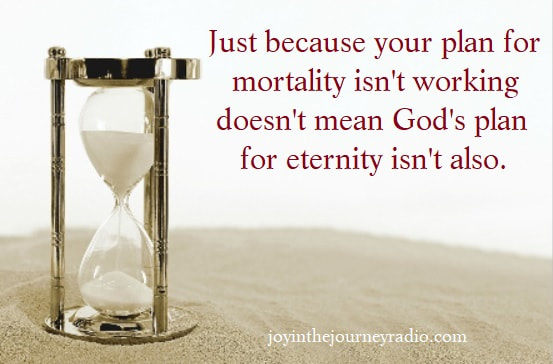

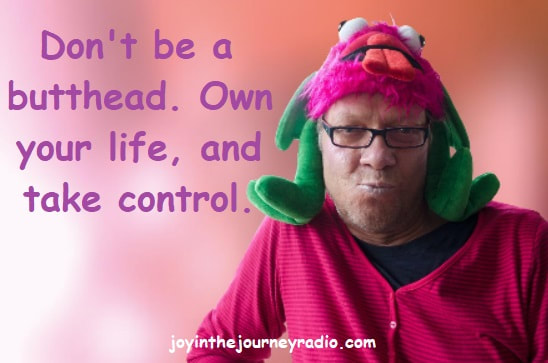
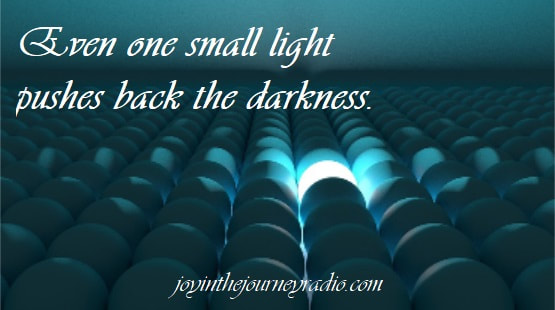



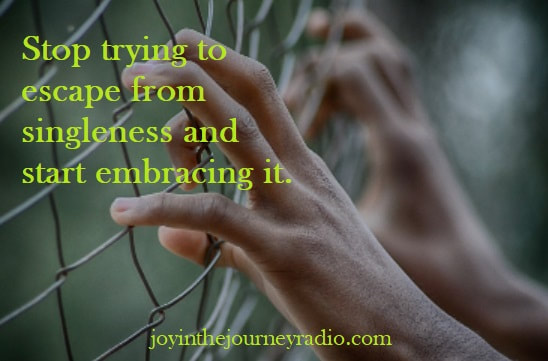


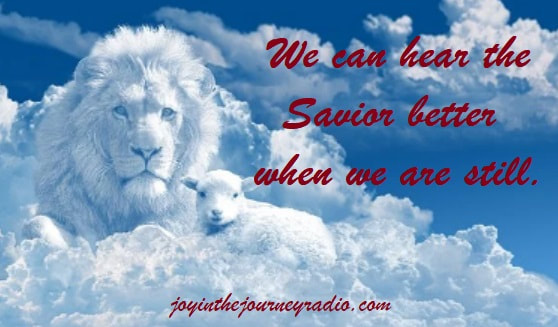

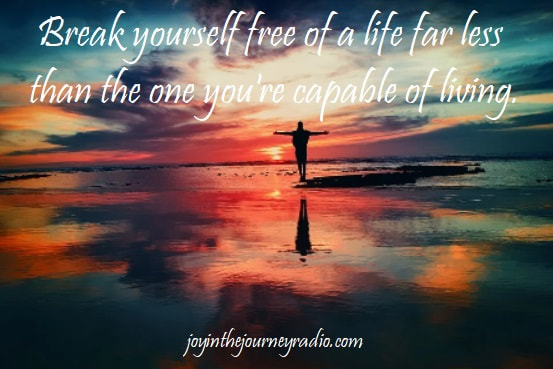
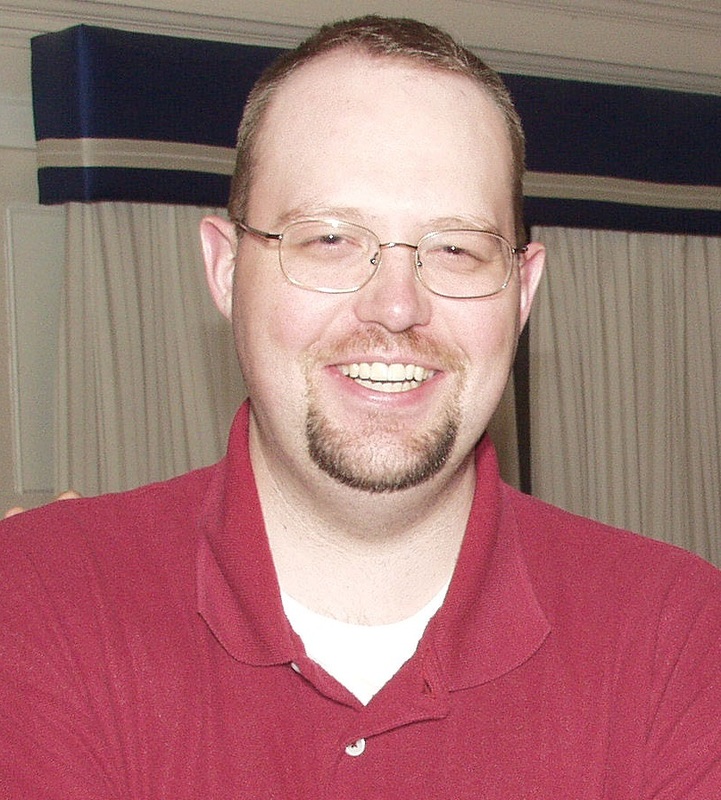
 RSS Feed
RSS Feed